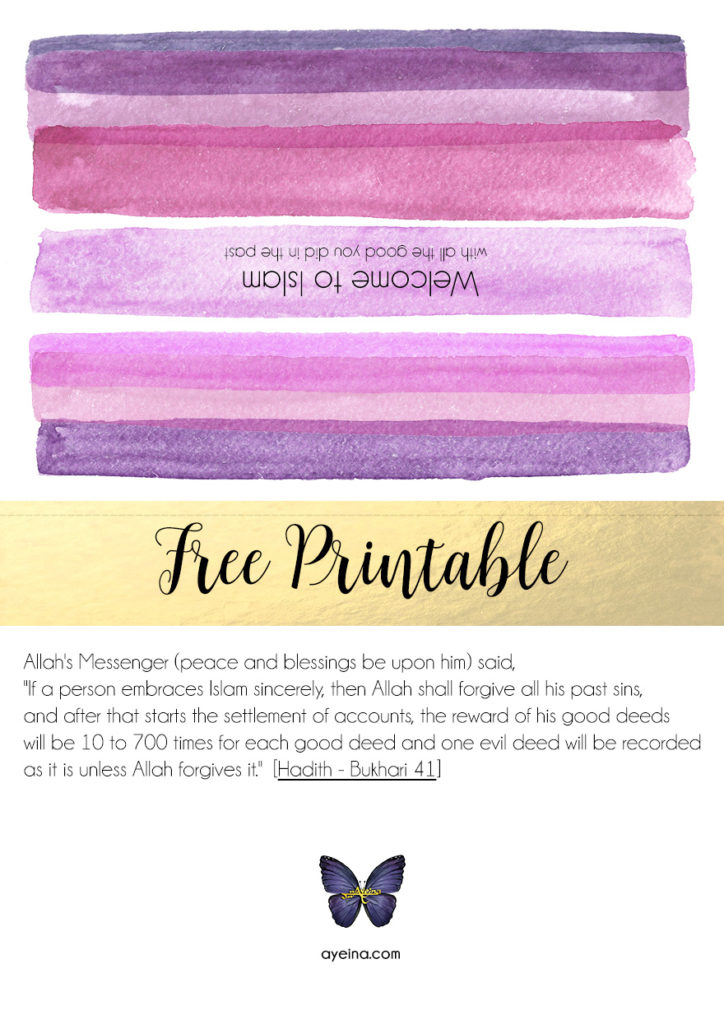THERE are two questions I repeatedly answer, as I am sure most people that have followed similar paths in life do: “Why did you become a Muslim” (or some variation on that theme) and more specifically relating to my intercultural marriage, although also generally applying to my reversion to Islam. “If you had to do it over again, would you?” As the old adage goes “Hindsight is 20/20”. And the answer is one hundred percent, absolutely, wholly, emphatically “Yes.” Although the road was not paved in gold, rainbows, and butterflies (more like many sporadically spaced razor blades, landmines, and booby traps) and I have made a million mistakes, I would do it all over again in a heart-beat. That being said, since I have learned quite a bit in the last eight years I feel there is no reason for someone not to capitalize on my experiences. In my mind, I know that having someone to talk to who had actually been through similar experiences made a real difference in my ability to deal with my hardships. At the same time, Islam draws people from all walks of life, different family structures, educational backgrounds, and income levels. There is very limited advice that can be given that will apply to all new Muslims. However, that being said I will do my best.
1) It will be hard and perhaps lonely too
You will be lonely, alone, sad, grumpy and the like – you are choosing to follow the teachings of Islam, not entering Jannah on earth! Reverting to Islam will make your life better, but it will not solve all your problems or give you a “charmed” existence. You will still have problems and hardships, at times seemingly more so; now, you just have a different method of dealing with them. As with any new life experience, there is a “honeymoon phase”. Enjoy this. You will be energetic about learning and practicing your religion, you will be joyful and optimistic. You will experience a love you have never felt before. Please know that like anything else in this dunya, it does not last. You will probably miss a prayer. You may sleep through suhoor. You will get angry. You are human. Your emotions will wax and wane, do not let them disenchant you. Although you cannot prevent the inevitable decline in energy that is derived from the newness of this path you have chosen, there are some things you can keep in mind to make your transition easier.
2) Be patient because it gets better
”O you who have believed, seek help through patience and prayer. Indeed, Allah is with the patient.” (Qur’an – 2: 153)
Your patience muscle will be your biggest asset for the rest of your life. You will need patience in every facet of your existence from now on. Simply be patient, rinse, and repeat.
3) Have reasonable expectations for yourself
Do not “cram” and attempt an overnight Muslim makeover. This will ultimately be fruitless, exhausting, and potentially damaging to all your earthly relationships, as well as your relationship with Allah (Subhanahu wa Ta’ala). The path to strong eeman is a marathon, not a sprint, in shaa Allah. It can seem at times that the knowledge to be absorbed is overwhelming and that you want to dive into your new life with both feet, but frankly, you might drown. Think of yourself as a sponge. If you take a dry sponge and place it under running water a lot of water will run right over it. It will get wet, but you have wasted quite a bit of water. If you take the same dry sponge and place it in a bowl it will saturate itself to its fullest in time, and the excess water will be accessible, not wasted.
4) Your interpersonal relationships will change
Due to your decision to change your religion, there will be many changes in your life. The majority of the changes will involve your interpersonal relationships. Although some things cannot be helped, how you approach these changes can mean the difference between maintaining friendships for a lifetime and falling asleep on the couch on a Friday night while watching infomercials. Do not forget to clue your family and close friends into the changes you are making, and the thought processes behind them, even if they do not ask. If you don’t tell them what is happening in your mind and clue them into the process, they might wake up one day and you are completely different from where they “left you”. These changes make sense to you, but they might not to your loved ones; immediately or ever. Although this can be immensely frustrating, I advise taking a proactive approach when initiating or navigating these conversations. Your relationships will be tested front and back, up and down, left to right, and side to side because Islam is a way of life. There is not one relationship you have that is unaffected. Addressing them with a plan and a clear head will save you from harmful miscommunications, hurtful arguments, and severed ties.
5) Open and gradual communication helps
Honesty and open communication are the keys – even if you have to spell out your needs and wants to everyone else. Your first priority should be your family. Despite what you might think about them and their beliefs, you are Muslim because of them. It was written for them to be parents to a Muslim. Remember that everything they ever taught you, everything they ever did for you, allowed you to be able to view the world the way that you do. Be grateful to them, however much they refuse to accept their part in your new religion. Allah chose them for you and you for them. Although it is easier to tell your friends first, it is not the best thing in the long run. Although there are some parents that would inflict bodily harm, evict, or disown their children if they became Muslim, these are far and few between. Many people overestimate the reaction of their parents, or they completely dump the “Hey guys, I’m Muslim now, and I married an Arab, and I’m moving to the Middle East” conversation and wonder why their parents flip! Opening a dialogue with some casual and strategically placed pondering can do wonders. For example, if you selected a news article to share with your parents about Islam and asked their thoughts, you might be pleasantly surprised. If you are not surprised, do not let this deter you. Be patient, rinse, and repeat. Every conversation that discusses Islam and does not end in tears and bloodshed is a victory.
6) Evaluate your current friendships
As you wrestle with the “coming out” to your parents, you need to begin to evaluate your current friendships. Depending on your lifestyle before your reversion, you might have some spring cleaning to do. Although your “bestie” was by your side for “everything”, it is a distinct possibility that they will not be by your side for this. Don’t make assumptions about who will be on your side. The people I thought would be against my decision were often the most supportive. On a less fortunate note, some people I thought were good friends simply fell to the wayside. Some people will just never understand why you had to “go and change”. That is perfectly fine, you just need to evaluate whether or not that type of person deserves to be in your life. There will be a lot of people, those observant little sprites, that will “get it” without you having to explain it. It usually is not the person closest to us. It usually is an “outsider” with an unbiased viewpoint, perhaps a former classmate or mutual acquaintance.
7) Surround yourself with positive influences
Evaluating your friendship pool, although as daunting as laundry day, is vital to your success as a new Muslim. Certain haram actions will be forever associated with certain people; this is simply a fact of life. Just as addicts in recovery have to avoid certain places, people, and routines, you will need to avoid parts of your past. It is up to you to surround yourself with supportive and positive influences during this crucial time in your development.
8) Avoid rushing into marriage
On a semi-related caveat, I would advise that new Muslims do not get married for a couple of years after their reversion, if possible. I advise this because as a child or an adolescent, new Muslims are still developing their tastes and personality. You do not know what “type” of Muslim you are yet and you will probably not feel the same way about certain issues in a few years. At the same time, you are extremely vulnerable. If you become married too soon before you become educated on your deen, how will you be able to determine whether or not your spouse is “on your level”? They could be practicing an “Islam” riddled with cultural innovations, and you would be none the wiser until you have wasted years and brought children into the picture. Please learn to ride without training wheels before you try to ride in tandem. I know it can be lonely, but it can save you from being trapped in a difficult or compromising situation.
9) It’s ok to stick to your culture and identity as long as it doesn’t contradict Islam
You have your own culture, your own likes, and dislikes. You do not need to become an Arab, or a South Asian. If you want fried chicken or beef and broccoli instead of biriyani or kabsa, have it! Your dress, your speech, and your hobbies can all represent your culture without contradicting Islam. I am not a proponent of the “Western haters” or the people that believe that Muslim countries are “safe havens” and “models” for the world. Yes, some things are a lot easier to do in a Muslim country, but some things are a lot more difficult too. We are not supposed to keep our lineage a secret, nor sever family ties. Giving yourself an Arab name does not make you any more Muslim than wearing an abaya does. Changing your name is not an obligation if the meaning of your name is good. The damage done by segregating yourself from your nation and ancestry is only perpetuating the stereotypes and misconceptions that exist about Islam. Some people seem to benefit from changing their name as it helps them take a break from the past and start afresh. But do not let people believe you must wipe away your identity, become an Arab, abandon your homeland, or destroy your roots in order to worship Allah. Allah placed you on this earth at a specific time and location. Being approachable and relatable is dawah in itself, and you do not need to compromise your religion to do so. If others cannot see a bit of themselves in you, how can you expect them to view Islam as something other than foreign?
10) Don’t be offended by unsolicited advice
So you have told your family, and weeded your friendship garden, what is next? Weaving yourself into the ummah can be a difficult thing. A lot of Muslim communities are segregated by nationality, ancestry, income level, and sect, and for someone not indoctrinated in this mentality, it can be devastating. When you gather information about Islam, one does not actually learn about Muslims. Islam is perfect. Muslims, as are all human beings, are incredibly, momentously, and unapologetically flawed. There is some unprecedented prejudice, discrimination, innovation, and corruption in many Muslim communities (as well as countries). Do not assume because someone is “born Muslim”, they know what they are doing. Unfortunately, many people are “by default” Muslims. Their parents are Muslims, therefore they are. They have not put much thought or effort into their deen, and they are aimlessly wandering the earth, right into a masjid near you! Everyone will try to teach you how to pray, how to read Arabic, and how to make wudu. Don’t be offended, and don’t turn them away. Let them teach you till your eyes glaze over! But, as with all other information; collect, hypothesize, experiment, and analyze. You will receive “fatwas” from everyone from the imam to the cleaners to the parking attendant to the Starbucks cashier next to the masjid. Pray to Allah for guidance, and keep an open mind.
11) Seek knowledge yourself
Do your own research and use your brain. Only you will be responsible for your actions on the Day of Judgment, so you better get behind the wheel! This being said, although you will receive a lot of useless, or erroneous information, you will also receive solid and sound advice and knowledge. Take everything with a grain of salt, and a sense of humor. Take classes, attend seminars and lectures, and volunteer. Attend every mosque within driving distance. Research everything ad nauseam online and in person. Ask every Muslim person you know about everything, and read, read, read! You’ll be ok. I promise.
12) You are the face of Islam, like it or not.
Everyone and I mean everyone will ask you why you reverted to Islam. Be prepared. This is your time to shine and participate in one of the most important aspects of dawah; discourse. Although this can be a heavy burden to bear, it does not need to weigh you down. You are the expert on your story, tell it. Don’t be shy, you never know where your story might take others. Speak from your heart. Be honest. You do not need to expose your sin, but try to find common ground with your audience. If you do not feel comfortable (or even if you do) explaining the basics of Islam to a person, it can be extremely helpful to carry pocket literature for their reference. A simple, “I am still new, but the answers to your questions are in this book” can be effective. However, I would encourage you to provide as much verbal (accurate) information as possible. It is also a good idea to keep the email addresses of some charismatic Muslim leaders in your area to provide. There will be plenty of people that are genuinely interested in your story and Islam. However, there will be just as many people that want to cruelly mock you, or simply have a compulsion to ask stupid questions (like an itch that has to be scratched). Contrary to what your elementary school teacher told you, there are an infinite number of stupid questions. You will be asked, all of them. Repeatedly. This point applies even more specifically to those new sisters (or old) that practice hijab. Many people will ask you “Do you wear it in the shower?” or “Does your husband get to see your hair?”Realize that this is your test. Your dealings with these people can change their lives. Always assume that the questioner has the best of intentions and answer politely. Smiles are recommended. I have heard a lot of sisters brag about responding to inquiries about their resistance to heat in this manner “I’m hot, but hellfire is hotter.” Although this answer is seemingly clever, you are severing interfaith ties and unnecessarily slamming the door to potentially productive discourse. Channel your energy into positive and productive responses and exchanges, instead of creating clever and biting comebacks.
13) Don’t let others make you feel insecure about your decisions.
You will have no shortage of people who think you are one feather away from flying over a cuckoo’s nest. No matter what you do, if it is different from the “norm”, then people will be curious or wary. People will make terrible and inaccurate assumptions about you, just as they do everyone else. You only feel as if you are on trial because of your confidence level and comfort with your life choices. When you used to pilot a new outfit, did you feel as if the whole world was against you if someone didn’t appreciate it? Probably not. So don’t feel as if the whole world is against you and other Muslims just because some idiot on the subway calls you a towel-head. People will assume you are foreign. They will assume you don’t speak English. They might even assume that you are a terrorist or that you have been brainwashed.You cannot live your life based on the validation of other people. If you want to be a Muslim, or do anything else in your life, you have to accept that there will be people who do not agree with your decisions. Some will disagree in their minds, some will disagree with their tongues, and some will disagree with their proverbial (or not so proverbial) swords. Remember the popular fable “The miller, his son and the donkey”. It is impossible to please everyone, so you must stand by your own decisions.
14) Have a sense of humour
This life is a blessing with all its sorrows, hardships, laughter, and joy. Do not miss the beauty of the gifts you have been given. Your path, although difficult, will be immensely rewarding. If you let it be. Find the hilarity in the intense. Find the levity in the painful. Enjoy the ludicrous hurdles that you will now scale simply because you pray five times a day, or because you wear a piece of cloth on your head. The human condition is a complicated yet simple thing. We made life too difficult for each other. If you can enjoy the simplicity of this struggle we call life and bring joy and laughter to others, it won’t seem so bad.
15) Don’t give up
“Allah says, ‘I am just as My servant thinks I am, and I am with him if he remembers Me. If he remembers Me in himself, I too, remember him in Myself; and if he remembers Me in a group of people, I remember him in a group that is better than them; and if he comes one span nearer to Me, I go one cubit nearer to him; and if he comes one cubit nearer to Me, I go a distance of two outstretched arms nearer to him; and if he comes to Me walking, I go to him running.” .
Cherish every step you take.

___________________________________________________________________
Author’s Bio: Kate Lynn





